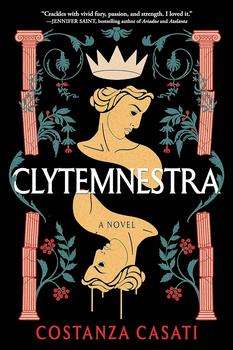Summary | Excerpt | Reading Guide | Discuss | Reviews | Beyond the Book | Readalikes | Genres & Themes | Author Bio

A Novel
by Costanza CasatiA King
Every time a stranger arrives in Sparta, the palace turns into a house of whispers. News travels as fast as sea breeze and the servants make every surface shine like gold. In the late afternoon, when the light is thinning and the air scented, they call Clytemnestra for her cleansing. "An important man will be here for dinner," they twitter.
"A warrior?" asks Clytemnestra, as they walk toward the baths in the darkness of the corridor. Her ankle hurts less every day, and soon she will be able to run and exercise again.
"A king," they say. "Or that is what we heard."
In the bathroom, Helen is already cleaning herself in the painted clay bath, the old wounds on her arms dressed with herbs. Her face is smooth, luminous again. Only one bruise remains, on her left cheek, where the bone was broken. Two more tubs are ready beside her, filled to the brim with water, and behind them an old servant woman is preparing soap. It is made from olives, and it smells rich and fruity.
"Have you heard?" Helen asks.
Clytemnestra takes off her tunic and climbs into her tub. "It's been a while since we had any guests."
"It was time," Helen says, smiling to herself. She always enjoys it when visitors come to the palace.
The door opens. Timandra rushes into the room, breathless, and leaps into the cold bath. Her feet and hands are dirty, her hair messy. She has already started to bleed but her body is still lean, without any trace of feminine curves.
"Clean yourself, Timandra," Clytemnestra says. "It looks like you've been rolling in the dirt."
Timandra laughs. "Well, that is what I was doing."
Helen smiles and her face glows. She is in a good mood. "We can't be dirty for a while," she says, her voice lively with excitement. "A rich king is coming."
The servant starts combing her hair, her brown spotted hands untangling Helen's locks as if they were spun gold. Timandra feels for knots in her own dark hair. "I can be dirty," she says, eyeing Helen. "The king must certainly be for you."
"I am sure he doesn't come for marriage. It must be some economic proposition."
Clytemnestra feels hurt. Why must Helen be the only one ready for marriage?
As if she's read her mind, Helen says, "Maybe he will court Clytemnestra." Her words are as silky as cream, but for the first time something underlies them, something Clytemnestra can't quite tell.
"I hate kings," she says carelessly. There is no reply, and when she turns to her sister, Helen is looking at her, her eyes dark and fierce.
"No, you don't," Helen says. "You will marry a king."
Clytemnestra wants to say she doesn't care about marrying a king as much as becoming a great queen. But she can see that Helen is hurt already—the same hurt that creeps in every time Clytemnestra dismisses her—and knows it is a useless argument. Let the men be proud and quarrelsome. She reaches out her hand and touches Helen's shoulder.
"We all will," she says.
Helen smiles and her face brightens, like the ripest fruit.
* * *
They sit together in a large room close to the dining hall for their mousike class, a chest filled with flutes and lyres in front of them. Their tutor, an older noblewoman who often performs poetry at dinner, is teaching them a new tune, plucking the strings of her lyre. Helen's brows are furrowed in concentration. Timandra is scoffing, looking at her feet, and Clytemnestra nudges her.
It is a song on the wrath of Artemis, on the wretched fate of the men who dare to challenge the gods. The teacher sings of the hunter Actaeon, who saw the goddess bathing in a spring on the mountains and called the rest of his party to join him. But no man is allowed to watch Artemis without witnessing the goddess's rage. Thus the hunter became the hunted, the teacher concludes, and as Actaeon fled deeper and deeper into the woods, Artemis turned him into a stag.
Excerpted from Clytemnestra by Costanza Casati. Copyright © 2023 by Costanza Casati. Excerpted by permission of Sourcebooks. All rights reserved. No part of this excerpt may be reproduced or reprinted without permission in writing from the publisher.
Your guide toexceptional books
BookBrowse seeks out and recommends the best in contemporary fiction and nonfiction—books that not only engage and entertain but also deepen our understanding of ourselves and the world around us.